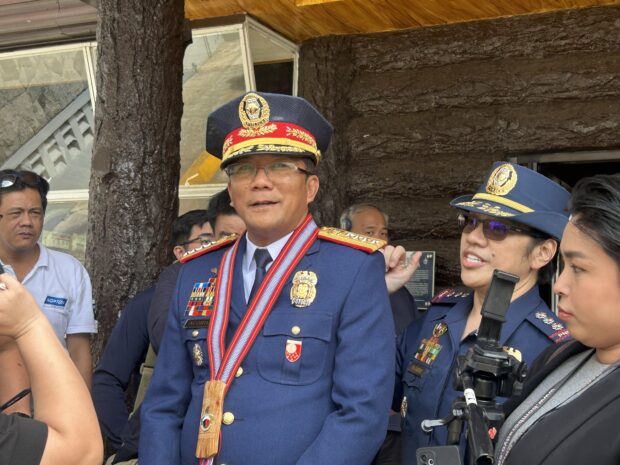Media group alarmed at PNP move vs rumor mills

Philippine National Police chief Gen. Benjamin Acorda Jr. talks to members of the media after a testimonial parade and review in his honor at the Philippine Military Academy in Baguio City on Saturday, Nov. 11, 2023. (File photo by FAITH ARGOSINO / INQUIRER.net)
MANILA, Philippines — Any attempts by the police to launch crackdowns on content creators they deemed behind moves to “destabilize” the Marcos administration should be a cause for public alarm, a media rights watchdog said on Saturday, fearing this may trample one’s freedom of speech.
Such an order by the Philippine National Police only presents itself as if it was an “arbiter of free expression” and should be viewed with alarm, according to the Center for Media Freedom and Responsibility (CMFR).
This was in response to Gen. Benjamin Acorda Jr., chief of the PNP, who ordered last week to hunt down content creators allegedly spreading disinformation across social media to “destabilize” President Ferdinand Marcos Jr.’s administration.
The PNP said Acorda wants criminal complaints be filed against these content creators, whom they accused of peddling disinformation.
One example they cited was a YouTube channel that had content claiming that generals from the police and the military were allegedly joining forces to sign a manifesto asking the president to step down.
Article continues after this advertisementThe YouTube channel being referred to is called “The General’s Opinion,” which, as of this writing, has 106,000 unverified subscribers and has video content containing rumors about the Marcos administration and videos about supposed rumblings within the administration’s circle.
Article continues after this advertisementMost of the videos were hosted by retired Brig. Gen. Johnny Macanas, one of the military officers who joined the foiled ouster plot against former President Corazon Aquino in 1989.
One of the videos also showed a photo of Acorda and Armed Forces chief Gen. Romeo Brawner Jr., which prompted the PNP to make moves against the contents, by directing the Anti-Cybercrime Group to intensify its cyberpatrols behind these contents that they described as something trying to bring down the president.
But these moves did not sit well with the CMFR, reminding the PNP of the risks posed by these actions.
Protected speech
“Any interference by the police that results in shutting down or taking to account those engaging views in the public forum, including social media, encroaches on freedom of speech and expression, which is protected by the Constitution,” said CMFR executive director Melinda Quintos de Jesus.
De Jesus pointed out that the recent order by the PNP was no different with the recent actions against the embattled Sonshine Media Network International, which recently faced a series of legal struggles.
It was also the same pattern applied during the time of former President Rodrigo Duterte, whose “displeasure” with broadcast giant ABS-CBN was “so openly expressed” that apparently drove Congress not to renew its franchise, she added.
“The report about the police intent to interfere with [the] media and the public forum creates a climate of fear,” De Jesus said. “The PNP statement suggests that any police officer can interpret as destabilizing what an individual or group says in a political discussion on any media platform.”
Should there be any pieces of evidence that would show content creators committing a crime through their videos or other content, the police should instead stick with the appropriate processes by holding them accountable in the court of law, De Jesus stressed.
A law enforcement agency involving itself to impose restrictions to free expression is already a “misuse or abuse” of state power, she also said.
“The involvement of the PNP in this issue is disturbing, to say the least,” De Jesus said. “It recalls dark periods in our history when indeed the police with the military were at the forefront as guardians of a dictatorial regime.”